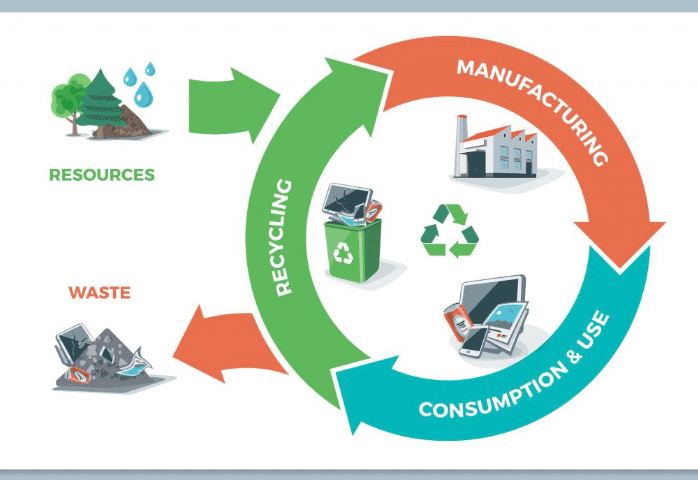You may have heard people talk about a circular economy and wondered what it means and what it has to do with you. Here’s a short explanation and how it applies to Domtar and the paper and pulp industry.
Over the last 100 years, the world’s economic growth has been driven by a linear (as opposed to circular) approach to the manufacture and use of products. Natural resources are extracted from the planet and manufacturing facilities produce a huge array of products while consuming inordinate quantities of raw materials and generating pollution. The goods are then purchased by consumers who use and discard them, ending a product’s life in the dumpster after only a single-use. The linear model looks like this:
TAKE IT→MAKE IT→WASTE IT
Today, the world has recognized that the rapid depletion of natural resources and unprecedented increase in waste cannot continue if we want future generations to thrive. That’s why corporations, governments and non-governmental organizations have partnered to shift the linear system to a circular one, where natural resources are responsibly managed and regenerated. Those raw materials then enter production processes that use renewable energy, reuse manufacturing byproducts and create products designed to be recoverable, recyclable and reusable. This enables consumers to continually use, reuse and recycle products and their components into the circular flow, extending their value for as long as possible. The circular economy model looks like this:

Domtar’s comprehensive approach to sustainability supports the circular business model across our entire value chain. It starts with sourcing wood fiber from responsibly managed forests. Sustainable harvesting ensures forest growth that helps sequester CO2 from the atmosphere, provides wildlife habitats, recreation for people and improved air and water quality for the planet.
The circular journey continues with our safe and efficient production of paper and pulp products. We maximize the fiber from every tree harvested and the byproducts from our manufacturing process to create value and eliminate waste. We reintroduce biomass residuals from production back into the mill to supply 72 percent of the energy we use to power them. And our use of biomass fuels in our mills’ on-site cogeneration processes enables us to create Renewable Energy Certificates (RECs) to help other businesses reduce their carbon footprint. Continuous improvement initiatives and engineering innovations accelerate the circularity and efficiency of our manufacturing operations.
Finally, at the consumer level, our supply of paper and pulp, made from the most renewable source on the planet—wood fiber—allows customers to play a role in accelerating the world’s shift to a circular economy. Consumers who choose paper and pulp products responsibly sourced and manufactured, as we do at Domtar, are practicing environmental stewardship. And those who make the recycling of paper, packaging and pulp products part of their daily routine move their consumption from single to multiple-use, re-introducing the product back into the circular model over and over again. Both of these consumer choices conserve natural resources and energy, reduce impact on the environment and climate and contribute to economic growth and job creation.
Check out the EPA’s website to learn more about recycling for citizens, the benefits of paper recycling and recycling basics.
For more information on the circular economy, please visit the Ellen MacArthur Foundation




Discussion